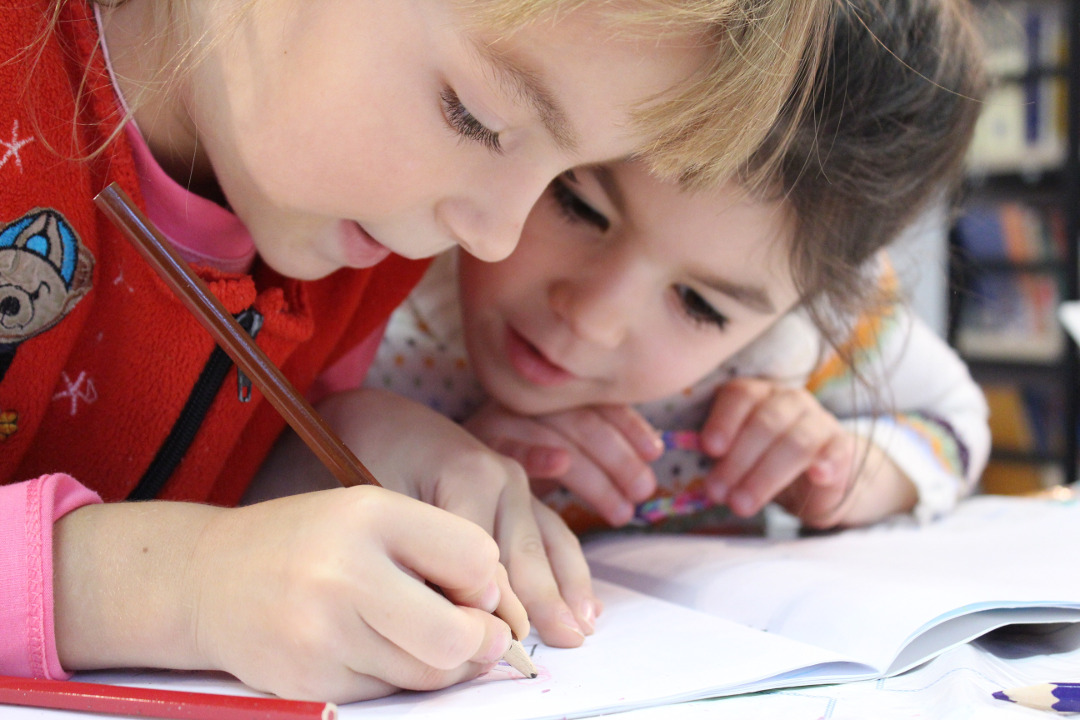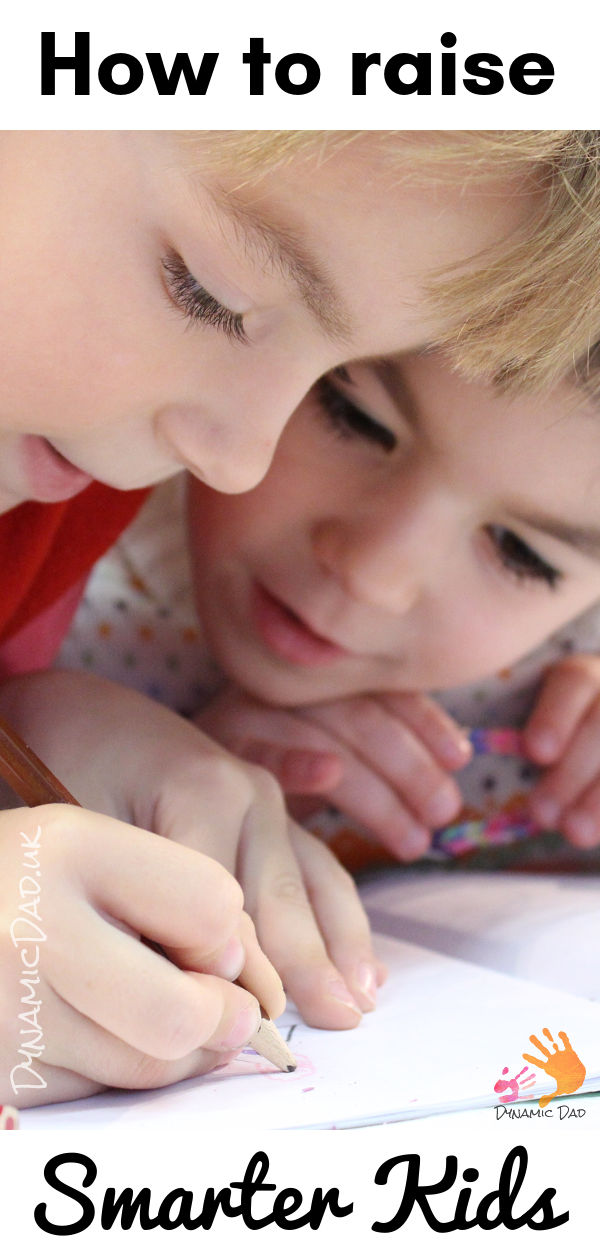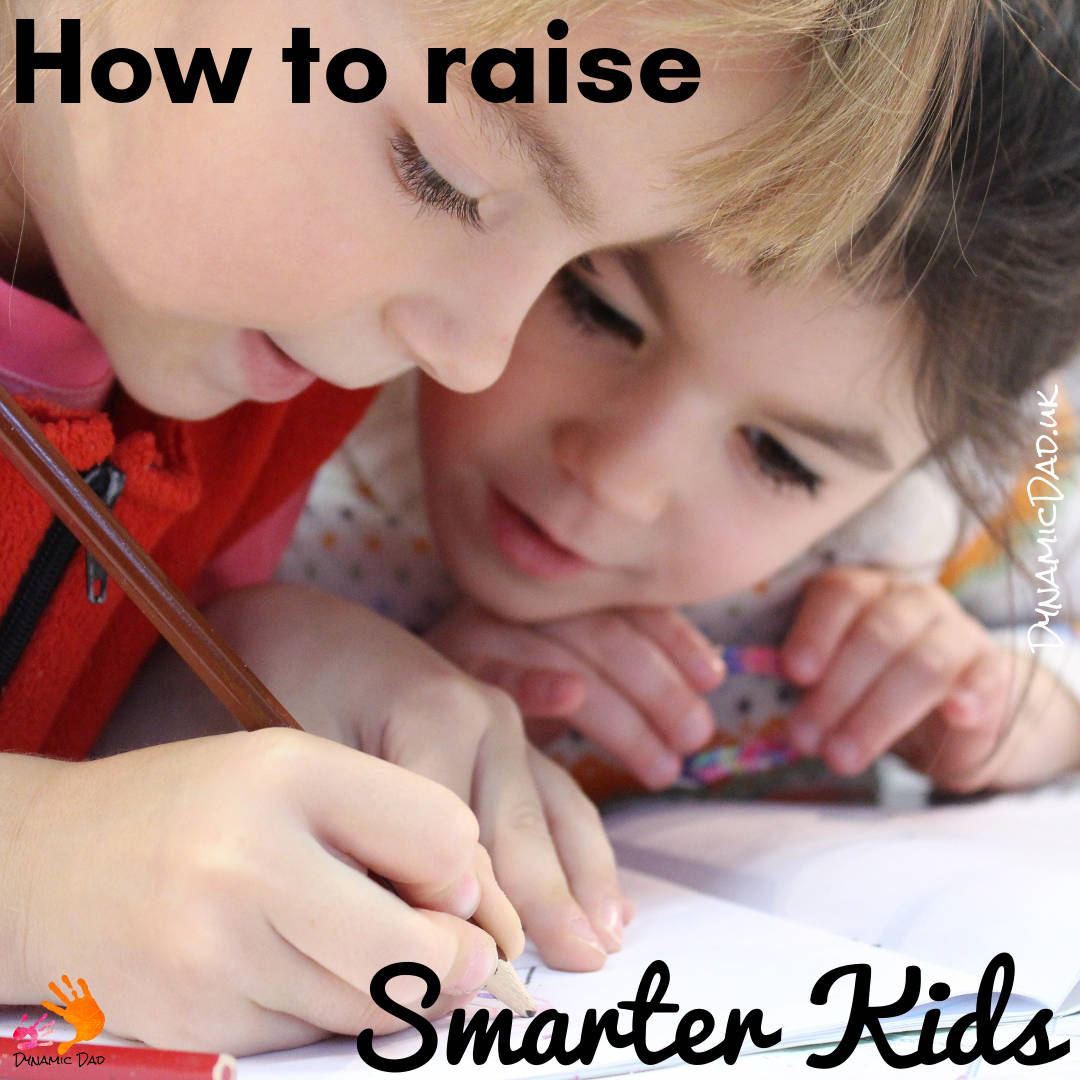How to raise smarter kids

We all want to see our kids do better than ourselves – but sometimes it can be hard to help them.
If you really want to raise smarter kids, here are some scientifically proven ways to help them excel, muddled in with some simple tips and activities to help them learn without realising.
Smarter kids exercise more:
There’s a negative stigma attached to some of the sporting and athletic types that can be profoundly unfair. Yes, those who spend their time on the field or track at the expense of study are likely to achieve a lower performance on an IQ test. However, being fit and healthy can help improve the rate you pick up new vocabulary – by 20%!
From Spark: The Revolutionary New Science of Exercise and the Brain:
Indeed, in a 2007 study of humans, German researchers found that people learn vocabulary words 20 percent faster following exercise than they did before exercise, and that the rate of learning correlated directly with levels of BDNF.
After only three months of a consistent exercise regime, bloodflow increases to the parts of the brain responsible for memory and learning – by 30%!
In his study, Small put a group of volunteers on a three-month exercise regimen and then took pictures of their brains… What he saw was that the capillary volume in the memory area of the hippocampus increased by 30 percent, a truly remarkable change.
Not bad, eh?
So – get your kids exercising (leading by example of course…) – but make sure that equal effort is put into academic study and there could (and should) be a significant ‘payoff’ and improvement in performance all round. Healthy kids are smarter kids.
Team and competitive sports will also teach your children important things in their own different ways, many of which will be very useful in later life – on the way to and in the boardroom.
Tactics are important both in team games and individual sports, referees have to exercise skill in diplomacy, and the ability to ‘read’ your opponent is highly valuable in all sports – and businesses.
Exercise has significant, immediate additional benefits too – keeping in shape typically brings with it positive self image, an abundance of energy, general happiness and also better sleep.
Which brings me on to…
Smarter kids sleep more:
Academic results can be correlated with sleep – in a pretty significant way.
From NurtureShock:
“A loss of one hour of sleep is equivalent to [the loss of] two years of cognitive maturation and development,”
Teens who received A’s averaged about fifteen more minutes sleep than the B students, who in turn averaged fifteen more minutes than the C’s, and so on. Wahlstrom’s data was an almost perfect replication of results from an earlier study of over 3,000 Rhode Island high schoolers by Brown’s Carskadon. Certainly, these are averages, but the consistency of the two studies stands out. Every fifteen minutes counts.
So, get into those bedtime routines – and stick to them. Ensuring your little people rise bright-eyed and bushy-tailed will mean they become brighter, and so will their future – even if they’re taller than you already.
Smarter parents read with their kids, not to them:
Many of us will read a story as part of a bedtime routine; and so we should. Einstein is often quoted to have said:
“If you want your children to be intelligent, read them fairy tales. If you want them to be more intelligent, read them more fairy tales.”
While the quote is in debate, the intent is not. Encouraging imagination and creativity in children is crucial for their problem solving abilities in later life, whether it is in negotiation, engineering, scientific research, business or any other field. We as a society would not be where we are or have what we have without imaginative, creative people.
As they get older however, read to them less and with them more. Learning is an active process, not a passive one. There are a plethora of theories of learning out there, some quoted more than others. Ultimately they all boil down to the same thing – the more ways you engage your brain in learning something, the faster and better you will learn it. So, with younger children, draw their attention to the words – they will otherwise be naturally drawn to the pictures. As their reading skills develop, draw attention the punctuation and why there might be a comma, or a full stop.
Ask your child to read a few words or sentences to you, ask them what they think the words mean, ask them afterwards why something was said or done. You can do this even with very early books like “The Very Hungry Caterpillar” – Why did the caterpillar eat so much? Because it needed the energy from the food to help it grow.
Or, The Gruffalo – what was the mouse doing? He made the Gruffalo think he was scary – so he didn’t get eaten.
The mouse thought his way out of being lunch, this is an important lesson on its own – when your children know it’s possible to think their way out of (or into) something, they’re already ahead of the pack – because the pack is just waiting for it to happen to them, or not.
As they get older still, encourage your children to test themselves as much, if not more than, they read and study.
From the author of The Talent Code:
“We learn when we’re in our discomfort zone. When you’re struggling, that’s when you’re getting smarter. The more time you spend there, the faster you learn. It’s better to spend a very, very high quality ten minutes, or even ten seconds, than it is to spend a mediocre hour. You want to practice where you are on the edge of your ability, reaching over and over again, making mistakes, failing, realizing those mistakes and reaching again.”
“Our brains evolved to learn by doing things, not by hearing about them. This is one of the reasons that, for a lot of skills, it’s much better to spend about two thirds of your time testing yourself on it rather than absorbing it. There’s a rule of two thirds. If you want to, say, memorize a passage, it’s better to spend 30 percent of your time reading it, and the other 70 percent of your time testing yourself on that knowledge.” ~ Barking Up The Wrong Tree
You can work testing questions into your daily conversation and I recommend you do; as an example:
It’s my father’s birthday this weekend. He’s 10 times my daughter’s age – so I asked her how old he will be. She worked it out, and then said “So today, he must be 9 times my age!” – no, but she’s thinking – so she’s learning. I asked her what 9 times her age was and she struggled – she doesn’t know her 9 times table yet and she has 60-1 stuck in her head. She looked at her times table chart to try and find 59, which she couldn’t – because it’s a prime number. So this one question gave us a load to talk about, engaged active learning and introduced prime numbers again.
This kind of Scenario Based Teaching/Learning is a great way to ask questions about anything, maths, spelling, science etc. and help children (or anyone) learn. It works because many find it easier to apply knowledge to a practical or theoretical example, rather than answering a straight question.
Smarter kids avoid “Brain Training” games:
…because they don’t actually work.
In Brain Rules for Baby: how to Raise a Smart and Happy Child from Zero to Five, John Medina says:
The products didn’t work at all. They had no positive effect on the vocabularies of the target audience, infants 17-24 months. Some did actual harm. For every hour per day the children spent watching certain baby DVD’s and videos, the infants understood an average of six to eight fewer words than infants who did not watch them.
This is also explored in my post “Why screen time is bad parenting – the Insta generation”. The effect is twofold – first, the screen time itself has been linked to reduced attention and executive function – which is not a good start, but also that movement is effectively restricted, and active engagement has been shown to increase and improve learning and development.
The solutions to this we’ve looked at already – reading with your children, drawing their attention to new vocabulary and punctuation, actively encouraging them to say the new words and explain their meanings, testing them with ‘real-life’ scenarios and so on.
This parental involvement and active learning far outperforms the perceived benefits of apps and videos.
Smarter kids learn a musical instrument:
Not just for kids, but for you and the grandparents too – music lessons make you smarter.
Compared with children in the control groups, children in the music groups exhibited greater increases in full-scale IQ. The effect was relatively small, but it generalized across IQ subtests, index scores, and a standardized measure of academic achievement.
Also;
New research shows that musicians’ brains are highly developed in a way that makes the musicians alert, interested in learning, disposed to see the whole picture, calm, and playful. The same traits have previously been found among world-class athletes, top-level managers, and individuals who practice transcendental meditation.
And:
A growing body of research finds musical training gives students learning advantages in the classroom.
Isn’t this what we all want? To help our children get smarter give them the opportunity to become a world-class, top-level, anything?
Smarter kids are self disciplined:
Willpower and determination outstrip raw intelligence and predisposed ability in all areas. While a child could be born with the ‘right’ genes and access to the ‘best’ education, they will be outperformed by their peers who tried harder.
From the book The Power of Habit: Why We Do What We Do in Life and Business by Charles Duhigg:
Dozens of studies show that willpower is the single most important keystone habit for individual success… Students who exerted high levels of willpower were more likely to earn higher grades in their classes and gain admission into more selective schools…“Highly self-disciplined adolescents outperformed their more impulsive peers on every academic-performance variable,” the researchers wrote.
This will be a surprise to many I’m sure, but it is something that is really easy to instil – all you actually have to do is practice it! As a parent, give them responsibility to complete an achievable but testing task or series of tasks, and reward them at the end – if they are successful. Medals for participation don’t make future leaders, I’m afraid. However, support, coaching and motivation to keep trying – do.
Start with a simple task that will stretch them, motivate them along the way and help them by coaching (not by doing it for them) to achieve the task. They will feel a strong sense of achievement, as well as receiving whatever reward you set, and they’ll be better able to face a tougher challenge next time.
Running low on willpower? Eat.
I’ve noticed with my little terror – and others – that they start to play up if they’re low on energy, and normally well before they realise they’re hungry. Supply a semi-constant stream of suitable, healthy food & drink, keep their blood sugar at as stable a level as possible and you’ll see a world of difference in behaviour, attention, learning ability – and willpower.
Smarter kids eat healthily:
Our children are growing – you’ve probably noticed. They grow a lot. To do this, they need the right food and the right amount of it. A balanced diet is essential, in the correct proportions.
I can’t possibly tell you to give them x grams of this and y grams of that. Neither will I tell you to withhold all fatty or sweet snacks. Everything is OK – in moderation.
You already know that fresh food is better than frozen, and that pre-prepared microwave dinners should be for emergency use only. I know that you’re busy and that cooking every night is possibly unrealistic.
Luckily, I’m not here to preach.
I am however going to remind you of what you already know – a varied diet is going to give them the best possible range of nutrients that they need to grow both physically and academically. Brown breads, pastas and rices are better than the white varieties – they take longer to digest, release their energy more slowly so prevent energy spikes and crashes.
Different coloured vegetables contain antioxidants, chicken, eggs, meats and fish are rich in protein and oils – all essential building blocks for the body and brain.
Do what you can to provide fresh, unprocessed foods, whether that’s breakfast, dinner or in their lunchbox – it does make a significant difference to their ability to learn.
Know though, there will always be room for dessert!
And so there should be…
While there is social pressure to avoid caffeinated, added sugar food and drink (and rightly so) – in moderation applies here too. Both sugar and caffeine have been shown to increase attention and focus – after all, that’s why we use them!
Allowing some at the right time could help – with homework for example, exam study, or before a sports match… as part of a varied and well balanced diet.
Smarter kids succumb to positive peer pressure:
Guess what? It works both ways.
Hang out with the ‘bad’ kids, and they won’t do so well. But hanging out with the ‘good’ kids can have a seriously positive effect on their academic performance and life skills.
So – make sure they hang out with the ‘good’ kids!
Socialising with other children is massively beneficial at any age but is sadly in decline as discussed in this post.
Be the parent that instigates and supports homework clubs followed by time to play. Encourage your children to nurture strong friendships that can continue into adolescence – in the real world – not just online.
Studies of college students have shown that sharing with a higher achieving room mate has the effect of improving the grades of the lesser-able partner. This applies to the peer group of younger children too. Their behaviours, habits, vocabulary and abilities will rub off on one another – and they spend a lot more time with each other than they do with you.
Happy kids are smarter kids:
Happy children are far more likely to become happy adults, and happy adults experience more success at work and at home.
Ensuring your kids are happy does not mean giving them everything they want. Rather, it is giving them what they need – which is your time and the knowledge that they are responsible for their own happiness.
Give them boundaries, challenges and rewards. Give them your attention and support. Show them the value of the person.
If you’re going to give gifts, make them thoughtful, relevant and useful. Don’t just buy them the shiniest widget you can find. Their eyes will light up, yes, but only temporarily – until the widget tarnishes. Make memories instead, and a photo album.
Know that the secret to a happy childhood lies with happy parents. If this means you have to look in the mirror and get your … together, then do it.
I know personally that it can be hard to put yourself first sometimes – but actually, if you don’t look after #1 – who’s going to look after the rest?
Smarter parents believe in their kids:
Belief makes a huge difference to many things is this world.
Religion aside, the physiological implications of belief have a sound foundation.
Back when Man was hunted by Dinosaurs* we had to carefully balance our energy expenditure. If we weren’t going to win, we couldn’t afford to expend all our running away and hiding energy. This meant of course that we didn’t win, but that we could run away and hide.
Today, our brains are wired the same way. We won’t release all our resources if we don’t believe in a successful outcome. However, when we do believe we will achieve our goal, our brain releases all those in-case-of-failure reserves to the task at hand – more strength, energy, concentration and accuracy.
This is because we know that when we succeed, we’ll be eating Sabretooth for dinner, rather than the other way around.
Belief is contagious, just like yawns. If you believe in your child – genuinely believe, they will too. When they believe, anything is possible – because their brains will release the necessary resources.
*Historical licence. The answer is actually 42. Best laid plans of mice, you know.
Want to know more? I’ve linked to some excellent books throughout this post – pick up a couple and apply some of the tips. You could even borrow them from the library, and introduce your children to a world of resources – for free.







I LOVE this post! All these things!! It won’t work for everyone, but I’m sure that things like eating healthy, getting the right amount of sleep, exercising and having a positive attitude really contribute to a child’s general overall wellbeing. And happy children tend to do well, especially with supportive parents cheering them on. Thanks for joining us for the #dreamteam – great to have you 🙂
These are great points! If we work with and not push our kids they will be smarter.
I opened this post expecting to roll my eyes at some conceited super parent type post. SO PLEASED I WAS WRONG!! 😀 #thatfridaylinky
I nodded along as I read this! #thatfridaylinky
thx I needed to know this
All suond advice and I know I need to read more to my kids, especially my youngest. Thank fully both are very active gymnasts and eat healthily (….most of the time!) so I think we’re part of the way there. #thatfridaylinky
This is great. I really love the ‘positive peer pressure’! yes!
Sorry – I’m checking in from #dreamteam